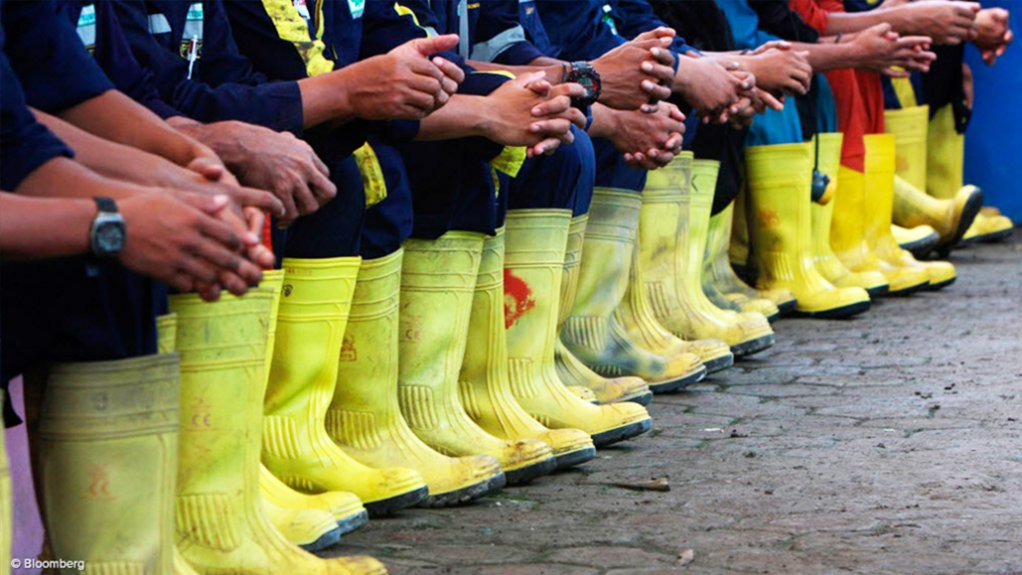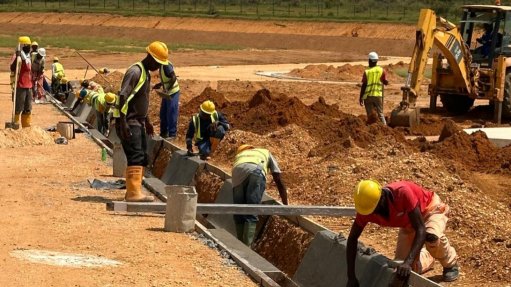Global mining forum IGF puts forward sweeping employment reforms
JOHANNESBURG (miningweekly.com) – The Intergovernmental Forum on Mining, Minerals, Metals and Sustainable Development (IGF) on Wednesday put forward sweeping mining employment reforms in response to the Covid-19 pandemic, which has, it states, exposed weak points in the global labour market.
IGF emerged from the 2002 World Summit on Sustainable Development held in Johannesburg, where delegates recognised the challenges and opportunities related to mining and sustainable development.
IGF stated in its latest publication that the impact of the Covid-19 pandemic on mining employment could be understated, and urged governments to act now to foster a resilient job market and protect their communities’ livelihoods.
Emphasising the impact of Covid on global mining employment, IGF stated that global mine sites were temporarily closing to protect workers’ health and safety. Employees were being laid off. Supply chains were slowing or halting production entirely.
Covid had exposed weak points in the global labour market, and up to 305-million full-time workers in all economic sectors were at risk of losing their jobs in the second quarter of 2020.
Large-scale mining had a more significant impact in remote regions, where other major economic sectors were often scarce or underdeveloped. Mining, therefore, played a critical role for host communities, as the main—if not the sole—job creator and provider of vital social services, IGF noted.
Mining activities created indirect employment along with business opportunities for local and national economies that can contribute up to 15% of a country’s national income.
What governments and mining companies should do is target and tailor effective long-term relief packages to the realities of the labour situation in mining and shift away from blanket measures.
Short-term government support provided to mining companies, contractors or suppliers must be conditional on keeping jobs and salaries throughout the pandemic.
Non-permanent contractual and migrant workers must be included in wage and social protection schemes, as well as having more security for unforeseen crises built into their contracts.
Health and safety standards must be applied consistently to protect all workers, in all mining companies, in any jurisdiction.
Social dialogue, including with labour unions, should be formalised to ensure oversight on working conditions in the future.
Permanent new health and safety protocols must be established.
Office and mine-face workplaces must be redesigned to be more spacious and flexible to limit the risk of disease spread, alongside increased investments in protective equipment and technologies.
Regulatory frameworks needed to be strengthened to ensure consistency in mine safety regulations with more rigorous on-the-ground applications and inspections.
Recovery measures undertaken needed to extend to local communities to prevent future contamination from outside sources.
Policy responses must provide strong mechanisms to build a resilient workforce for potential similar future events, ensuring that lower-income and vulnerable workers were not left just as vulnerable, jobless or poor when the short-term stimulus measures were removed.
Workers that Covid forces out of the mining labour market must be retrained and upskilled to ease their transition to other sectors.
Corporate solidarity funds must be used to provide post-crisis training in communities.
Risk analysis of the mining job market per occupation must be conducted to forecast employment relief support.
Corporate social responsibility policies must be rethought as impact investment instruments.
Investments in research and development must be increased to equip local businesses with digital solutions.
Governments and mining companies must collaborate to strengthen supply chains. Given that the resumption of disrupted global supply chains at different scales and times would force the mining sector to explore how to secure access to critical supplies for seamless production, governments should provide support measures to strengthen the industrial base and allow local businesses to capture larger parts of mining procurement markets.
Sustainable financial instruments should be designed to favour local businesses and support the growth of local enterprises.
Local content strategies should be rethought and implemented across sectors and strategic regional value chains developed to reduce risks and dependency on emerging markets.
According to the IGF website, the forum supports more than 75 nations committed to leveraging mining for sustainable development to ensure negative impacts are limited and financial benefits are shared. The forum states that it is devoted to optimising the benefits of mining to achieve poverty reduction, inclusive growth, social development and environmental stewardship.
The International Institute for Sustainable Development has served as Secretariat for the IGF since October 2015. Core funding is provided by the government of Canada.
Article Enquiry
Email Article
Save Article
Feedback
To advertise email advertising@creamermedia.co.za or click here
Announcements
What's On
Subscribe to improve your user experience...
Option 1 (equivalent of R125 a month):
Receive a weekly copy of Creamer Media's Engineering News & Mining Weekly magazine
(print copy for those in South Africa and e-magazine for those outside of South Africa)
Receive daily email newsletters
Access to full search results
Access archive of magazine back copies
Access to Projects in Progress
Access to ONE Research Report of your choice in PDF format
Option 2 (equivalent of R375 a month):
All benefits from Option 1
PLUS
Access to Creamer Media's Research Channel Africa for ALL Research Reports, in PDF format, on various industrial and mining sectors
including Electricity; Water; Energy Transition; Hydrogen; Roads, Rail and Ports; Coal; Gold; Platinum; Battery Metals; etc.
Already a subscriber?
Forgotten your password?
Receive weekly copy of Creamer Media's Engineering News & Mining Weekly magazine (print copy for those in South Africa and e-magazine for those outside of South Africa)
➕
Recieve daily email newsletters
➕
Access to full search results
➕
Access archive of magazine back copies
➕
Access to Projects in Progress
➕
Access to ONE Research Report of your choice in PDF format
RESEARCH CHANNEL AFRICA
R4500 (equivalent of R375 a month)
SUBSCRIBEAll benefits from Option 1
➕
Access to Creamer Media's Research Channel Africa for ALL Research Reports on various industrial and mining sectors, in PDF format, including on:
Electricity
➕
Water
➕
Energy Transition
➕
Hydrogen
➕
Roads, Rail and Ports
➕
Coal
➕
Gold
➕
Platinum
➕
Battery Metals
➕
etc.
Receive all benefits from Option 1 or Option 2 delivered to numerous people at your company
➕
Multiple User names and Passwords for simultaneous log-ins
➕
Intranet integration access to all in your organisation





















